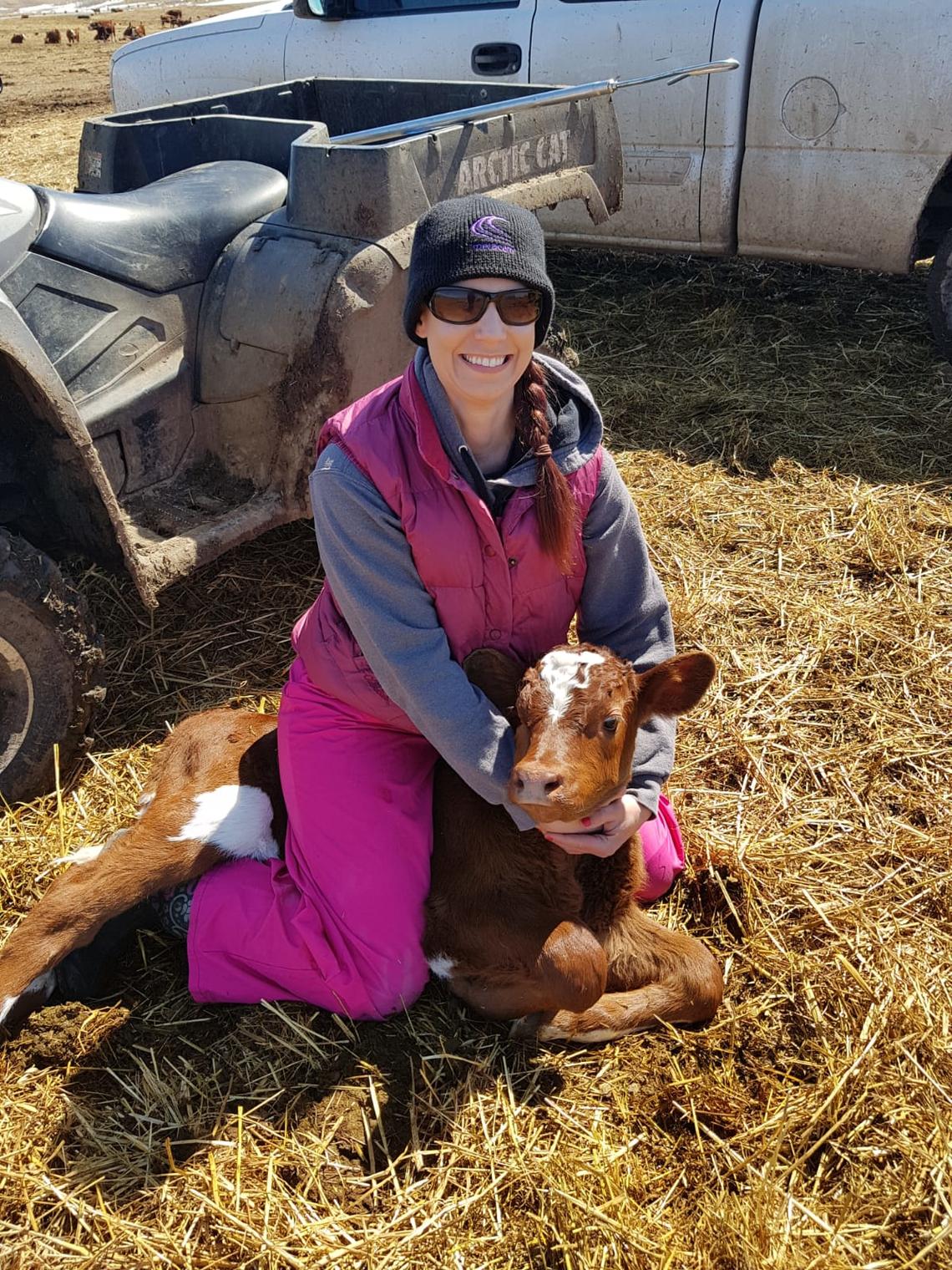April 30, 2019
Veterinarian PhD student at UCalgary passionate about helping newborn calves

Dr. Jennifer Pearson has a passion for cows, being outdoors, and research. Her PhD studies of newborn calf health at the Faculty of Veterinary Medicine (UCVM) allow her to combine all three.
“As a veterinarian, part of my job was to help deliver calves that needed assistance at birth,” says Pearson, who grew up around farm animals on an acreage with her two veterinarian parents. “I love working with cows and producers.”
Pearson is looking at ways to lessen the pain calves may suffer from a difficult birth, as well as ways to help them grow and thrive. It’s an area with direct implications for beef ranchers, as difficult calvings are a major cause of death in cow-calf herds.
Recently, an international association of cattle veterinary consultants recognized Pearson for her outstanding research. Her clinically relevant studies of beef calf health earned her the prestigious Douglas A. Armstrong Memorial Scholarship from the Academy of Veterinary Consultants. “Receiving this award, meeting past recipients, and having the opportunity to present at the beef cattle conference in Omaha was an incredible honour.”
Birth trauma results when calves are too large or come out the wrong way
Pearson became interested in newborn calf research from her experiences seeing calves suffer severe muscle trauma or oxygen deprivation following a difficult birth.
“Most commonly, the problem is either a calf is too large to fit through the birth canal or it comes out the wrong way,” explains Pearson. “Large calves can experience trauma having to squeeze their way out.”
Cattle producers are trying to limit some of these factors by breeding accordingly, for instance, by selecting bulls that will have the genetic potential to produce smaller calves. “But genetics alone can’t solve everything,” she says. “Just like with all types of animals giving birth, things can often go wrong.”
Pearson is studying the clinical impacts of an assisted or difficult calving on calf health. She has looked into pain management and mitigation strategies that will decrease the effect of the difficult birth on calves. Having the opportunity to get to know local producers and hear their concerns has helped her design future clinical research projects.

Jennifer Pearson became interested in newborn calf research after seeing calves suffer muscle trauma
Claire Windeyer
Benchmark studies underway to see how cattle ranchers handle difficult calving
“We also have several benchmarking studies in progress, to see what producers are doing,” says Pearson. “For instance, when do ranchers decide to intervene in assisting a calving, how often are cows being checked for signs of calving, what resuscitation techniques are being used after delivering compromised calves, and what colostrum management practices are performed.”
When a calf is deprived of oxygen during birth is may be weak and have trouble standing and suckling. Unlike humans, nutrients and antibodies aren’t transferred to calves through the placenta, but in the colostrum-rich first milk cows produce after giving birth.
“It’s extremely important to make sure neonatal calves get this colostrum because it’s how they develop their immunity. It’s crucial because the ones that don’t are at a higher risk of disease and death in the pre-weaning period,” says Pearson.
W.A. Ranches ‘an amazing gift’ for a calf health researcher
Pearson believes UCVM is a unique faculty because of its hands-on teaching labs and research opportunities to work with local cattle ranchers.
“WA Ranches is an incredible opportunity and an amazing gift,” she says. “At UCVM, we have the opportunity to do research on an operating ranch that is large and diverse. This offers a very practical learning experience that will greatly benefit local producers and the university.”
The Anderson and Chisholm families’ gift of W.A. Ranches supports UCVM’s strategic plan to support and respond to the needs of Alberta’s agriculture community with clinical and diagnostic expertise, and research excellence — and to become a leader amongst research-intensive North American veterinary colleges.
Anderson and Chisholm’s gift is part of the university’s ongoing fundraising campaign, Energize: The Campaign for Eyes High, the University of Calgary’s most ambitious fundraising campaign in its history. Funds raised through the campaign will support student experiences, research outcomes and community connections. Together we are fuelling transformational change for the University of Calgary, our city, and beyond — inspiring discovery, creativity and innovation for generations to come. The campaign is currently at $1.18 billion toward its overall goal of $1.3 billion.
